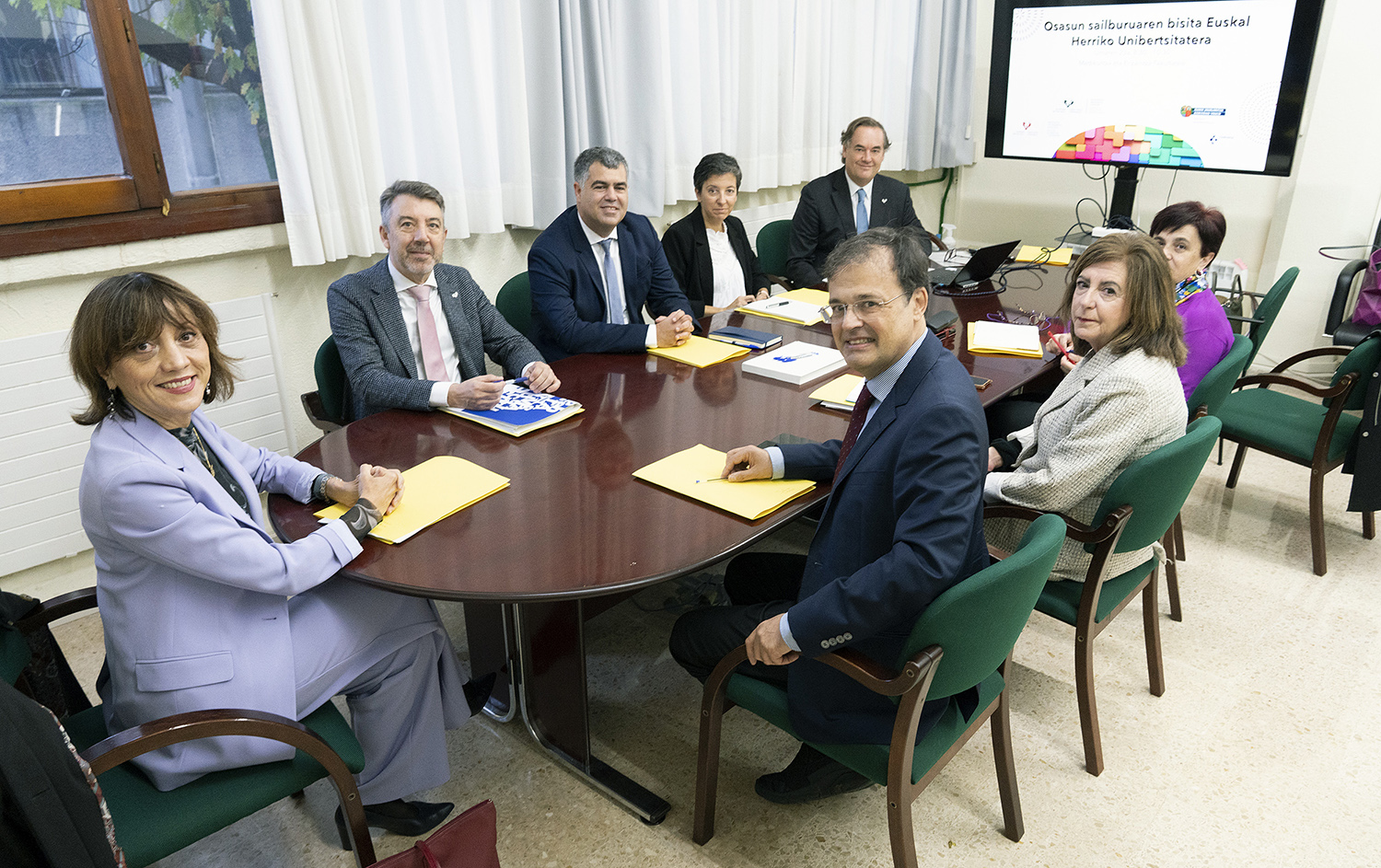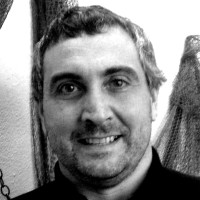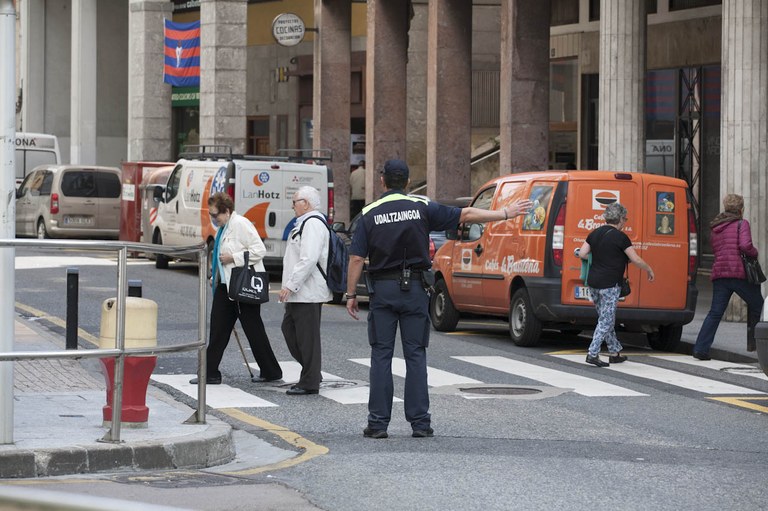Comrades
- Because he knows little, because he will make mistakes, because he will be blocked, because he is ashamed... he has a thousand reasons for the newcomer to learn Euskera not to speak in Basque with his colleagues. Sometimes, however, it is the peers who throw the language to whom he knows half Euskera. Mari Carmen Matthies and Itziar Redondo have been responsible for releasing the language. The Mielanjel Valley, for its part, has helped Luis Alberto make the leap to use.
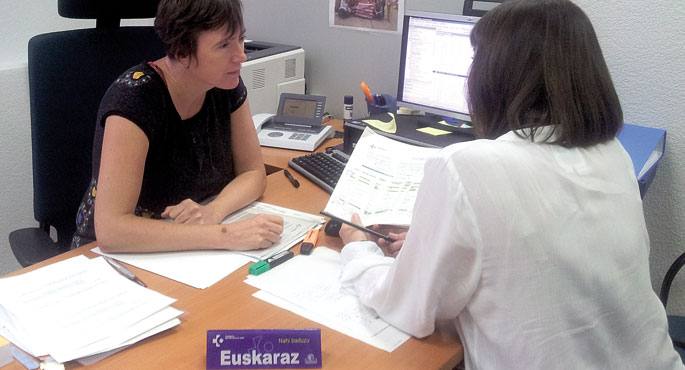
The general objective of the Aldahitz study was to investigate the processes of change of customs carried out by the workers who have learned Euskera in adulthood with their peers, from Spanish to Euskera. Eight cases have been analyzed of workers from both public institutions and private companies, as well as from different socio-linguistic areas of the Biscay region. The research work has been approached from a qualitative perspective, identifying the aspects that have appeared in all cases. The methodology used to collect information has been the interview. In addition to the interview with each of the workers, they also talked to their colleagues and colleagues who have been professors of Euskera. Through all these testimonies, they have been able to verify the linguistic evolution of these workers and the social and personal conditions in which it has been possible for these workers to go on using the Basque Country normally. The Cluster of Sociolinguistics has led the research work with the collaboration of several entities: AEK, EMUN, Vice-Ministry of Linguistic Policy, Hernani City Hall and Elhuyar Advisory.
Each worker has developed the process under specific conditions and characteristics, but there are some keys that have been detected in most cases. In total, the Sociolinguistics Cluster has drawn a dozen main conclusions, which we have listed under the headings in the next window. Here are three ideas from the conclusions they have drawn.
The use of Euskera has not been, in the case of the workers who analyzed it, something that has appeared at the end of the process. The use of the tongue has begun early and, once it has appeared, has been the main driver of the whole process. Use has enabled workers to improve their linguistic competence and, at the same time, to change their language habits with co-workers. Thanks to the use, therefore, the learning of Euskera and the habit of speaking in Euskera have come together in the same process.
Most of the workers who have changed language habits have received the invaluable help of an Euskaldun colleague and, in general, it is for those Basque colleagues and colleagues that the initiative and responsibility for continuing to speak in Euskera has been created. The fundamental change in the linguistic behavior of the workers has therefore occurred in the couples; in the couples with colleagues who know Euskera and are learning Euskera. The use of Euskera has been the focus of all these processes.
In most of the cases analyzed, there has been a turning point to make the leap from Spanish to Basque; “From now on we will do it in Basque”, for example, using expressions of this type. The new language standard has, in most cases, been fixed in an improvised way, at a given time and not progressively. Initially, Castilian has been used as a crutch in the face of various difficulties. Subsequently, specific management plans have been established for each learning process.
Mielanjel Harana, Euskera professor
The Valley has been a Euskera professor of the Head of Service of a public administration of 16 employees. He has helped the Head of Service make the leap from knowledge to use.
To know the case of another worker, we have come to his Basque professor. We have spoken to Mielanjel Harana (Amasa, 1958). He is a professor in the Basque Country Ilazki of Donostia and has been in the teaching world for 34 years. It has for many years been a language trainer for the Alet programme of the Provincial Council of Gipuzkoa. He is currently on leave.
Luis Alberto (alias) is the head of the service of a fairly large public administration, composed of about 16 members. He started working there about 20 years ago, when he was an erdaldun little boy. At that time, there were two or three workers who spoke in Basque. The learning process had to start from scratch and began to practice Euskera in the workplace with a partner, both with a low Basque level. “They wanted to learn Basque. The two spoke in Euskera torpe; they fought with words. These kinds of decisions are not the most normal. Luis Alberto was very motivated to learn Euskera; sentimental motivation. She was an Euskaldun mother, born in a hamlet in Alegia, and when she was a child, she saw that the children of her age spoke in Basque, which had bertsolaris... It was an admiration for that world.”
Mielanjel Harana met Luis Alberto when he had already done the whole process in the Basque Country. It helped him make the leap from knowledge to use; stressing that the most important thing was to communicate, leaving in the background the use of the high-level Basque and the use of the Basque without mistakes. “He is an attorney, who knows how to learn and who has very well internalized the structures of the language in the Basque Country, but the puzzles well done do not serve him to communicate. So to speak, I went to disteach it. All of a sudden I took her to Bertsolarism. Language is music, sound, dance. Text is a sheet music, while speech is moved by the rhythm and expression of the body. These are basic principles for me. You cannot show the language without these principles.”
How to learn to use it
We have talked for a long time with the Valley about the methodology and the importance of language teaching. He is in favour of practice and of sharing practice. These are the words of the Valley: “In the process of the Euskaltegi there is a great deviation among the students, and today I would say more. Euskaltegis should have the will to express themselves in speech. As for adult Euskaldunization, spelling, grammar, structures, etc., of course, they must be taught. But what matters is communication capacity. You have to give prominence to Euskera, even if it is with grammatical errors; there is a lack of ability to communicate in Euskera, and you have to be afraid of it. On the other hand, the issue of administrative qualifications also has a major impact. It’s easier for teachers or examiners to measure the student, do a test to account for errors, than go through other ways.”
Nowadays, Euskera is the working language of Luis Alberto and also most of his colleagues. He speaks Basque normally with his colleagues, and a few years ago he made himself with the fourth linguistic profile. The evolution of Luis Alberto and the evolution of the service have been very united throughout the process. A few years ago the service got the Bikain certificate.
We have asked the Valley for an assessment of the conclusions of the Aldahitz study: “The workers of all cases have had a personal victory, they have managed to adapt better or worse to Euskera, but they are able to speak in Basque. They've made a big change. Luis Alberto also achieved a personal victory. In addition, as head of service, he has managed to convey the spirit in favor of the Basque Country to the other workers. In most cases, the conclusions indicate that the victory of workers is due to the help of a partner. However, I have one important conclusion: victory has been possible thanks to the forced work of my colleague. We have to bear in mind that there are another five hundred cases that have failed. After five or six years of learning Euskera, the lessons are of no use to them. Many officials make a great effort to learn Basque. But what for? You haven't had one of these motivated colleagues next to you. And the Great Colleague was wrong. The Administration has not, in general, succeeded in making the workforce express itself in Basque; it has not established for them positive discrimination, an effective decision has not been taken, even if it can be. We have been 15 years behind, and Euskera officials are standing in for alien language petitions, taking care of their position in power. There is not enough will.”
Itziar Redondo, informatics
Listening to colleagues, analyzing the reports in Basque that the translator has written and sent... she has learned Basque Itziar Redondo, naturally and involuntarily, she says.
Itziar Redondo (Vitoria-Gasteiz, 1973) is computer scientist. In 2000, he began working in the informatics department of the Basque Government and had the task of working with members of the Vice-Ministry of Linguistic Policy to provide technical support in informatics: Euskalterm, toponymy database, electronic dictionaries… He had to manage projects related to the use of Euskera. He also met a Basque working centre. Euskera was the partner's relationship language, both formally and informally, as well as with external clients and suppliers. At that time, Redondo was not able to speak in Basque. Spanish is its first language and received the basic knowledge of Euskera in the center. “From the beginning I realized that the first thing I had to learn at work was the Basque. In the same way, if I had to learn Chinese or German, I know I would have learned. I started practicing Euskera with close colleagues; they made me the first proposal to speak in Basque. At first I answered them in Spanish, but then, little by little, I began to use Euskera.”
The main process of Redondo's Euskaldunization has been developed in the work center itself, and theirs is the learning process linked to its use. On this tour he has not had a special need for Euskaltegi or to learn the language systematically. It has developed in the same process the habit of speaking in Basque and the ability to do so in Basque. “I took the challenge as with a new computer tool, it was clear that I had to get the ability to speak in Basque. I tried to do it. The truth is, I didn't find it hard work. I had no trouble acting thanks to my colleagues and gradually we achieved the goal. I didn't go to the Basque Country until after eight years, and there I went to reflect the level obtained in a degree. I was introduced directly into step
10.” We asked him how he adapted to learn Basque: “I started listening to how my peers were talking and internalizing how the sentence structures were doing. I started talking little by little, learning. To work on the text I had the help of a colleague who addressed me short texts, e-mails... Moreover, we also had to write technical reports in Basque. At first, I would do them in Spanish and send them to translate. I was studying the reports that came back: terminology, structures ... Then I managed to write the reports personally.”
Currently, he holds the EGA certificate in Basque and does so with absolute normality among his co-workers. 4. It also works in the preparation for obtaining the PL. Itziar Redondo has taken home the language she has studied in the world of work. She has two young children and speaks Basque with them. “Now I’ve realized that I’ve changed language habits in that process. So far, I hadn't noticed. Just as I can be an expert in using a computer tool, I am now more able to speak in Basque. It has been a natural process, which I have achieved without wanting to.”
Mari Carmen Mathies, Osakidetza Worker
At Bermeo Hospital he was surrounded by fellow Basques. He soon enrolled in the language school. His colleagues enthusiastically helped him on his journey to the Basque country.
Mari Carmen Matthies (Bilbao, 1968) did not know a Euskaldun environment in her childhood; she had her first relationship with language at school. He only had one lesson he liked: The Basque. He spoke in Spanish at home with his parents and also on the street with his friends; at that time he had few possibilities and spaces to use the Basque language. Her mother learned Euskera in adulthood by attending night classes and later obtained the EGA title. That was important for Carmen; the first impulse to start learning Euskera. In 2002, when she became pregnant, she made the decision to learn Basque. The main motivation was the child, who wanted his mother tongue to be Basque. He then began to learn Basque on his own, using the Bakarka method.
In 2003 he started working in the area of Human Resources at the Bermeo Hospital in Osakidetza. She found a working environment and Basque colleagues: “It was something new to me and very important. Many colleagues spoke in Basque in their work, and also outside of it. I heard a lot of Euskera in the hospital.” Shortly afterwards he enrolled in the Bermeo language school. “I told my colleagues that I started learning Basque. At the time I had a hard time speaking in Basque and I did not dare to speak in public. I was very limited and I knew I made a lot of mistakes; I was completely blocked. My colleagues offered me their help to practice Basque. I was encouraged to speak in Basque.”
With the help of his colleagues and with what he learned in language school he began to use Euskera gradually and felt more comfortable. “At first I wasn’t corrected for mistakes. ‘You’ve done wrong!’ and they didn’t tell me. On the contrary, I was very encouraged. ‘You’re doing very well’, ‘You’ve realized what you’ve talked about today.’ And that was very nice to me. The aid received was key to making progress. If I had found another situation, I might not have achieved anything.” Most of Carmen's peers talked about Bermeo, and the use of this dialect did not hinder Carmen's learning process. At first, the companions leaned towards the Sumo to help them.
In 2008 he obtained the EGA certificate. 4. He also started preparing the HE, although he was not obliged to do so, but intended to act in Euskera with total normality in the formal work environment. Today she has been abandoned for personal reasons, but later on she will focus on the issue. Likewise, Carmen intends to enrich her dialect. Carmen currently lives in Morga, an Euskaldun atmosphere. Remembering her trajectory in the workplace, she now feels at ease. “When someone asks me something in the workplace or on the street, I give him the opportunity to speak in Basque or Spanish. I always make my first word in Basque. Ten years ago, I was no longer able to do so. I’ve made a change in language habits.”
We ask Carmen for a final reflection on the experience: “The support my colleagues gave me has been very important to me. There are times when that help is needed to move forward, and I found it. That's the key. On the other hand there is a personal commitment. I received help in my day and now I try to help others.”
- Erabilera ardatza da hizkuntza-ohitura berria eraikitzeko.
- Esperientzia nagusia “bikoteetan” gertatu da.
- Euskararen aldeko presioa kanpotik eta norberaren jarrera positiboa barrutik.
- Bidelagun euskaradun, euskaltzale eta euskalgile baten ezinbesteko laguntza.
- Hizkuntza-arau nagusia une batean aldatu da, ez pixkanaka.
- Harreman berria mamitu beharra, kideak egoera berriaren aurrean elkarri egokituz.
- Urtebete inguru behar izaten da erosotasuna egoera berrira etortzeko.
- Gertuko harremana eta maiztasun handia beharrezkoak dira.
- Konfiantzazko giroa hierarkia harremanen gainetik.
- Lantokia: euskaltoki nagusia.
- Hizkuntza-gaitasun mugatua ez da euskara erabiltzeko oztopoa.
Gasteizko 1 zenbakiko Auzitegi Kontentzioso-Administratiboak emandako epaia berretsi du EAEko Justizia Auzitegi Nagusiak. Lan poltsan parte hartzeko euskara maila altuenaren baliokide diren 3. eta 4. eskakizunak indargabetu zituen Gasteizko Auzitegiak.
In recent months I have had to work in a number of institutes and, at some point, I have had to talk to the students about the possibilities offered by the labour market. The typology of the students is varied and in the same city varies a lot from one neighborhood to another,... [+]
Languages Lan has just organised the first international conference on linguistic management in Bilbao. Much has been said in the Congress about language policy, management and tools. And emotions. And from emotions, how many cooperatives, companies and organizations in our... [+]
Few spend their whole lives at the same work. What was common at the time of our parents, today, is absolutely unusual. It seems that millennial generation youth will not spend five years in the same job and the time will be much shorter between Z and Alpha generations.
I too,... [+]











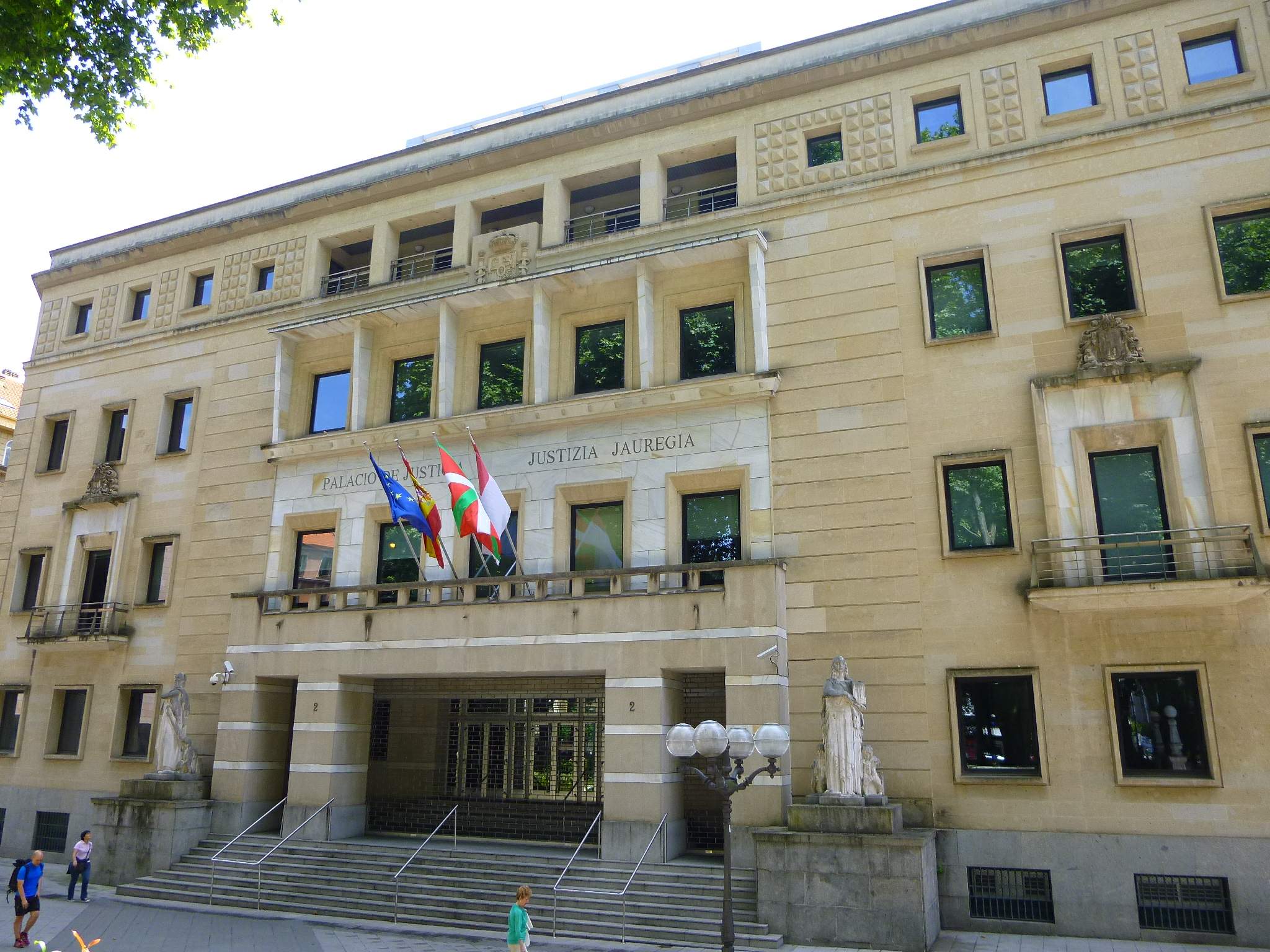
.jpg)
